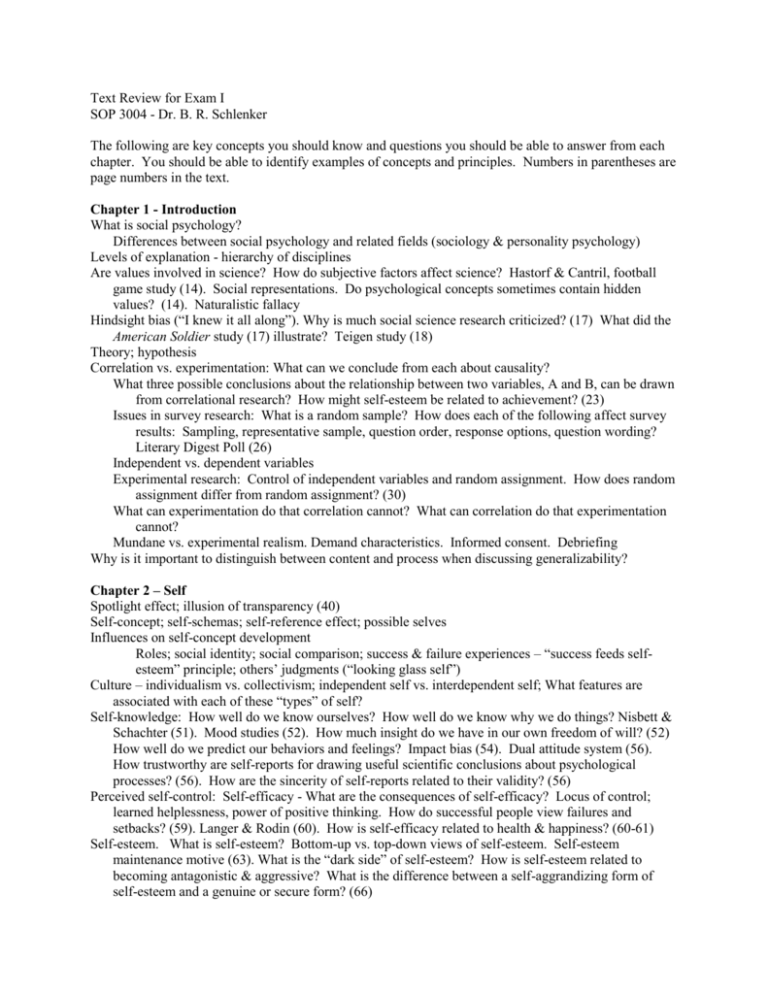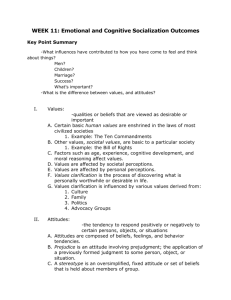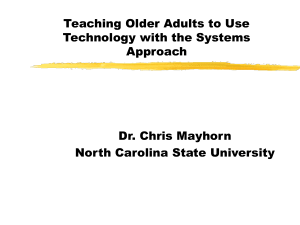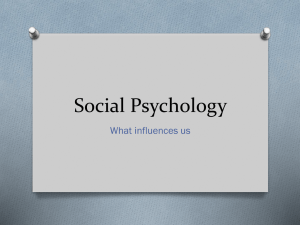Text Review for Exam I
advertisement

Text Review for Exam I SOP 3004 - Dr. B. R. Schlenker The following are key concepts you should know and questions you should be able to answer from each chapter. You should be able to identify examples of concepts and principles. Numbers in parentheses are page numbers in the text. Chapter 1 - Introduction What is social psychology? Differences between social psychology and related fields (sociology & personality psychology) Levels of explanation - hierarchy of disciplines Are values involved in science? How do subjective factors affect science? Hastorf & Cantril, football game study (14). Social representations. Do psychological concepts sometimes contain hidden values? (14). Naturalistic fallacy Hindsight bias (“I knew it all along”). Why is much social science research criticized? (17) What did the American Soldier study (17) illustrate? Teigen study (18) Theory; hypothesis Correlation vs. experimentation: What can we conclude from each about causality? What three possible conclusions about the relationship between two variables, A and B, can be drawn from correlational research? How might self-esteem be related to achievement? (23) Issues in survey research: What is a random sample? How does each of the following affect survey results: Sampling, representative sample, question order, response options, question wording? Literary Digest Poll (26) Independent vs. dependent variables Experimental research: Control of independent variables and random assignment. How does random assignment differ from random assignment? (30) What can experimentation do that correlation cannot? What can correlation do that experimentation cannot? Mundane vs. experimental realism. Demand characteristics. Informed consent. Debriefing Why is it important to distinguish between content and process when discussing generalizability? Chapter 2 – Self Spotlight effect; illusion of transparency (40) Self-concept; self-schemas; self-reference effect; possible selves Influences on self-concept development Roles; social identity; social comparison; success & failure experiences – “success feeds selfesteem” principle; others’ judgments (“looking glass self”) Culture – individualism vs. collectivism; independent self vs. interdependent self; What features are associated with each of these “types” of self? Self-knowledge: How well do we know ourselves? How well do we know why we do things? Nisbett & Schachter (51). Mood studies (52). How much insight do we have in our own freedom of will? (52) How well do we predict our behaviors and feelings? Impact bias (54). Dual attitude system (56). How trustworthy are self-reports for drawing useful scientific conclusions about psychological processes? (56). How are the sincerity of self-reports related to their validity? (56) Perceived self-control: Self-efficacy - What are the consequences of self-efficacy? Locus of control; learned helplessness, power of positive thinking. How do successful people view failures and setbacks? (59). Langer & Rodin (60). How is self-efficacy related to health & happiness? (60-61) Self-esteem. What is self-esteem? Bottom-up vs. top-down views of self-esteem. Self-esteem maintenance motive (63). What is the “dark side” of self-esteem? How is self-esteem related to becoming antagonistic & aggressive? What is the difference between a self-aggrandizing form of self-esteem and a genuine or secure form? (66) Self-serving bias What attributions do people make for success & failures? Ross & Sicoly (67) Better-than-average effect - When are we most likely to self-glorify? What are some other selfserving tendencies (70) Unrealistic optimism; Why might unrealistic optimism increase health vulnerability? Is it better to be pessimistic? False consensus / false uniqueness Is there a self-serving motive? (74) Is the self-serving bias adaptive or maladaptive? When is it each? Terror management theory (75). Selfglorification in groups (75-76) Self-presentation - Trying to create a desired image of self to other people False modesty; Self-handicapping [Berglas & Jones, 78]; Impression management; Self-monitoring: How do the behaviors of high and low self-monitors differ? How does culture affect self-presentation? (80). Are people self-enhancing worldwide? (80) Chapter 3 – Social Cognition Attribution: Internal & External Causes Attributions in relationships; gender attributions (Abbey, 85) Attribution theory. Who is the originator of attribution theory? (86). Correspondence between actions and dispositions (Jones & Davis, 86). Fundamental attribution error (FAE) or correspondence bias - How does this affect how we explain others’ behavior? (Jones & Harris, 88; Ditto et al., 88; Ross, Amabile & Steinmetz, 89) Actor/Observer difference - How do we explain our own behavior (as compared to how we explain others’ comparable behavior)? Why does this difference occur? Storms (92). If a confession tape focuses on the confessor, are jurors more or less likely to convict? Over time, what type of explanation becomes more salient? What happens to our attributions if we become self-aware? Why do we make the FAE? Are there cultural differences in the FAE? Is the FAE fundamental? Is it an error? Is it adaptive? Why should we study attribution errors? Constructing Interpretations and Memories: Do we respond objectively to reality? (Vallone, Ross, & Lepper, 99; Ross, Lepper, & Lord, 100) Belief perseverance (Anderson, Lepper, & Ross, 102). When we examine our theories to explain why they may be true, how does it affect our beliefs? How can belief perseverance be reduced? If people are instructed to be objective & unbiased, does it reduce perseverance? Reconstructive memory. Is memory like a mental storage chest? How well do people realize how much their attitudes change over time? Bem & McConnell (103); McFarland & Ross (104); Holmberg & Holmes (104). After going through self-improvement programs, how accurately do people perceive how much or little they have changed? (105). Misinformation effect; Priming How accurately do we make judgments? Intuition. Controlled vs. automatic thinking. How much can we know from intuition, without conscious awareness? What are the limits of intuition? Overconfidence phenomenon (Kahneman & Tversky, 109; Dunning et al., 109). What is it? Why does it occur? Does incompetence reduce or increase it? Are experts more likely to avoid overconfidence? Confirmation Bias. Are we usually more interested in verifying or falsifying our beliefs? Selfverification (Swann, 112) How can overconfidence be reduced? (112-113) Heuristics: Representativeness & Availability. Counterfactual thinking. How is the significance of the event related to counterfactual thinking? Illusory Thinking: Searching for order in daily life Illusory correlation (Ward & Jenkins, 116) Illusion of control (Langer, 117). Regression toward the average (Schaffner, 118). How does regression influence perceptions of the effectiveness of rewards & punishments? How does mood affect judgment? (Forgas 119). Do moods affect simple, automatic thinking more or less than complex, effortful thinking? Self-fulfilling beliefs – teacher expectancies (Rosenthal & Jacobson, 122). How big is the self-fulfilling effect? Why does it occur? What is likely to reduce it? Behavioral confirmation. Snyder, Tanke, & Berscheid (124). Cognitive bias in newsmaking (128). Chapter 14 – Social Psychology in the Clinic Making Clinical Judgments - Applies familiar concepts: illusory correlation, hindsight bias, overconfidence effect, self-confirming diagnoses. [Rosenham, 570; Snyder & Swann, 571; Fazio et al., 571; Kunda et al., 571; Renaud & Estess, 572] Are clinicians able to avoid these biases and misperceptions? Compare clinical vs. statistical prediction. Which is better? How well do experts’ judgments improve statistical predictions? Social Cognition and Problem Behaviors Depression - Are depressives overly negative or realistic? Depressive realism. Depressive explanatory style: Attributions about failures of self that are: Internal (“It’s all my fault”) rather than external, Stable (“It’s going to last forever”) rather than changeable, Global (“It’s going to affect everything I do”) rather than specific. Is negative thinking a cause or result of depression? How does depression affect interpersonal relations? How does depressive style relate to depression? How do self-focus and self-blame relate to depression? Loneliness - Does loneliness coincide with aloneness? What factors are related to loneliness? Do males and females experience loneliness in the same types of situations? Social anxiety - When do people feel socially anxious? What role does the motivation to impress others and doubts about the ability to do so play in creating social anxiety? In what situations are people most likely to be socially anxious? When people are socially anxious, how do they behave? How is shyness related to social anxiety? (Brodt & Zimbardo, 585) Social cognition and illness Behavioral medicine; health psychology How do people decide whether they are ill? How do they explain their symptoms? What are socially constructed disorders? What influences people’s willingness to seek and follow treatment? How do our emotions relate to our susceptibility to heart disease, stroke, cancer, and other ailments? How is stress related to physical illness? How is explanatory style related to illness? Treatment approaches - How do internal vs. external attributions influence treatment success? (592, 594) Social skills training. Explanatory style therapy; Do coercive therapy techniques produce both rapid improvement and long-term changes? Why do the effects of coercive therapy techniques wane? (594) How are supportive close relationships related to mental and physical well being? How does confiding in close others affect well being? Is marriage more closely associated with men’s happiness than women’s? Are single women happier than married women? Why does marriage enhance happiness? Ten research-based principles of happiness Chapter 4 – Attitudes What is an attitude? What are the three dimensions of attitudes? (134) Do attitudes always predict behavior? Wicker (135). Moral hypocrisy, Batson (135) When do attitudes predict behavior? (What conditions make it more probable that attitudes will guide behavior?) Minimize distorting social factors Minimize social influences on expressed attitudes. Bogus pipeline Minimize influences on behavior - Average across behaviors; principle of aggregation Examine attitudes specific to the action Maximize Potency of Attitudes Focus attention on attitude Think about attitudinal position (Snyder & Swann, 139) Become privately self-conscious (e.g., small mirror); Diener & Wallbom (139) When does behavior influence attitudes? What evidence indicates attitudes follow behavior? Role playing. Zimbardo prison experiment (141) Saying becomes believing. What evidence indicates saying becomes believing? Foot-in-the-door and low balling (Freedman & Fraser, 144; Cialdini, 145; Freedman, 147) Have racial attitudes changed after positive interracial behavior? Brainwashing; Schein (150) Why do actions affect attitudes? Theories of attitude change and formation (three theories): Self-presentation theory - Appear consistent; Cognitive dissonance theory - Justify actions; Self-perception theory - Actions are self-revealing Cognitive dissonance theory - Aversive arousal - rationalization (justification) [Festinger] Insufficient justification - Which produces more attitude change - Small or large rewards offered for a behavior? (Festinger & Carlsmith, 152). What principle explains which behaviors will produce attitude change? (154) Justifying prior decisions – What happens after a decision? (Brehm, 155) Self-perception theory - “I said it, so I must believe it” (Bem; Strack, 157) Overjustification effect / intrinsic motivation; Why does overjustification occur? When is it most (and least) likely to occur? Compare/contrast dissonance and self-perception theories - What is involved in each? What is selfaffirmation theory? How does self-affirmation affect justification? (162) When does each theory provide the better explanation? Which theory deals best with attitude change? Which deals best with attitude formation? Which explains the overjustification effect?









